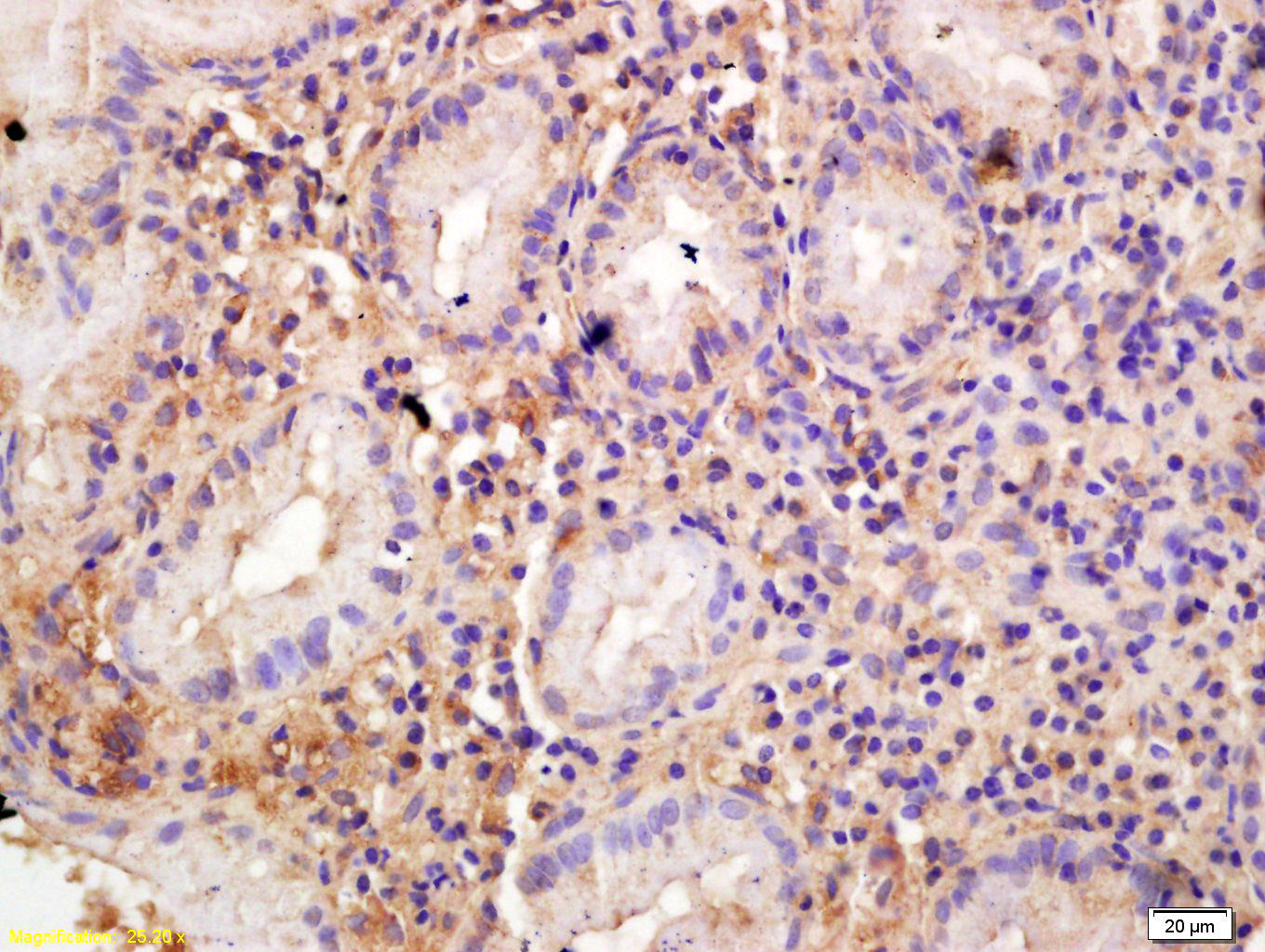
Rabbit Anti-MMP-26 antibody
MMP26_HUMAN; Endometase; Matrilysin 2; MMP26; Matrix Metalloproteinase 26; MMP 26.
View History [Clear]
Details
Product Name MMP-26 Chinese Name 基质金属蛋白酶-26抗体 Alias MMP26_HUMAN; Endometase; Matrilysin 2; MMP26; Matrix Metalloproteinase 26; MMP 26. Research Area Tumour Cell biology Signal transduction Cytoskeleton Extracellular matrix Ubiquitin Immunogen Species Rabbit Clonality Polyclonal React Species Human, Applications WB=1:500-2000 ELISA=1:5000-10000 IHC-P=1:100-500 IHC-F=1:100-500 IF=1:100-500 (Paraffin sections need antigen repair)
not yet tested in other applications.
optimal dilutions/concentrations should be determined by the end user.Theoretical molecular weight 18kDa Cellular localization Secretory protein Form Liquid Concentration 1mg/ml immunogen KLH conjugated synthetic peptide derived from human MMP26: 185-261/261 Lsotype IgG Purification affinity purified by Protein A Buffer Solution 0.01M TBS(pH7.4) with 1% BSA, 0.03% Proclin300 and 50% Glycerol. Storage Shipped at 4℃. Store at -20 °C for one year. Avoid repeated freeze/thaw cycles. Attention This product as supplied is intended for research use only, not for use in human, therapeutic or diagnostic applications. PubMed PubMed Product Detail Matrix metalloproteinase 26 preprotein; gelatinase A; 70kD type IV collagenase; gelatinase neutrophil. Proteins of the matrix metalloproteinase (MMP) family are involved in the breakdown of extracellular matrix in normal physiological processes as well as in disease processes. Most MMP's are secreted as inactive proproteins which are activated when cleaved by extracellular proteinases. MMP26 degrades type IV collagen, the major structural component of basement membranes. The enzyme plays a role in endometrial menstrual breakdown, regulation of vascularization and the inflammatory response.
Proteins of the matrix metalloproteinase (MMP) family are involved in the breakdown of extracellular matrix in normal physiological processes, such as embryonic development, reproduction, and tissue remodeling, as well as in disease processes, such as arthritis and metastasis. Most MMP's are secreted as inactive proproteins which are activated when cleaved by extracellular proteinases.
MMP26, also known as Matrilysin 2, was first cloned from human fetal cells, and identified as an MMP most closely related to MMP7 (Matrilysin 1). The homology between MMP7 and MMP26 is low (only 38% identical), thus the functions are unlikely to be similar. Homology is much higher (48% identical) for the comparable region of MMP12, but MMP26 appears to have broader substrate specificity than does MMP12. MMP26, like MMP7, lacks the hemopexin domain common to the other MMPs, but contains a Propeptide domain, cysteine switch activation site, followed by a catalytic domain, and a short vestige of the hinge region. MMP26 is apparently not glycosylated, and is a secreted MMP. Tissue analysis shows MMP26 most strongly in placenta and uterus, but also in kidney cells, lung cells, lymphocytes and lung or endometrial carcinoma cells. MMP26 is proteolytically active, cleaving casein in zymograms, and gelatin, a1PI, fibrinogen, fibronectin, vitronectin, type IV collagen, and apparently activating MMP9. The proteolytic activity was blocked by TIMP1 and TIMP2. MMP26 does not appear to be produced by most normal quiescent cells, but treatment of many cell types with the phorbol ester TPA, or IL1 stimulates production of MMP26.
Function:
May hydrolyze collagen type IV, fibronectin, fibrinogen, beta-casein, type I gelatin and alpha-1 proteinase inhibitor. Is also able to activate progelatinase B.
Subcellular Location:
Secreted, extracellular space, extracellular matrix.
Tissue Specificity:
Expressed specifically in uterus and placenta. Is also widely expressed in malignant tumors from different sources as well as in diverse tumor cell lines.
Similarity:
Belongs to the peptidase M10A family.
SWISS:
Q3MJ78
Gene ID:
56547
Database links:Entrez Gene: 56547 Human
Omim: 605470 Human
SwissProt: Q3MJ78 Human
SwissProt: Q9NRE1 Human
Unigene: 204732 Human
MMPs与Tumour的生物学行为密切相关,MMPs高表达的Tumour,其侵袭和转移性较强。而Tumour的侵袭和转移是衡量Tumour生物学行为的最重要的指标,也是Tumour致命性危害的根源。
MMP26为基质溶解素主要表达在上皮起源的Tumour,如乳腺癌、肺癌、前列腺癌及子宫内膜癌等。Product Picture
Antigen retrieval: citrate buffer ( 0.01M, pH 6.0 ), Boiling bathing for 15min; Block endogenous peroxidase by 3% Hydrogen peroxide for 30min; Blocking buffer (normal goat serum,C-0005) at 37℃ for 20 min;
Incubation: Anti-MMP-26 Polyclonal Antibody, Unconjugated(SL1377R) 1:200, overnight at 4°C, followed by conjugation to the secondary antibody(SP-0023) and DAB(C-0010) staining
References (0)
No References
Bought notes(bought amounts latest0)
No one bought this product
User Comment(Total0User Comment Num)
- No comment



 +86 571 56623320
+86 571 56623320
 +86 18668110335
+86 18668110335

